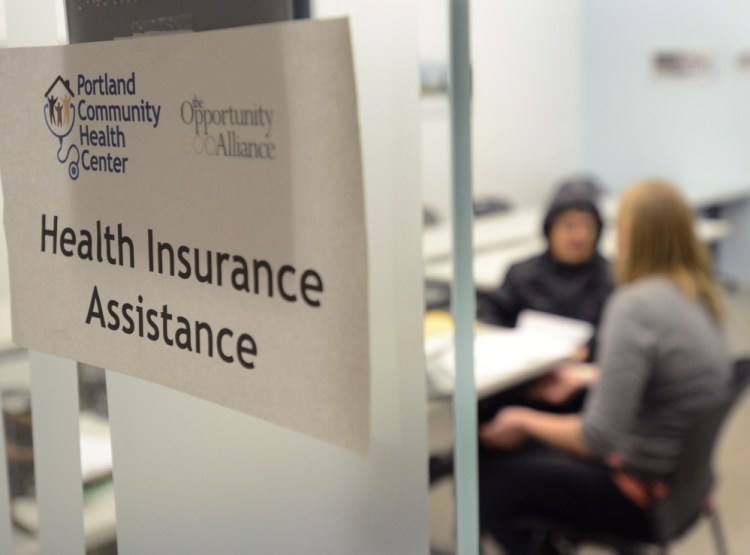The Trump administration is slashing outreach funding for the Affordable Care Act’s individual marketplace, and Maine will shoulder an 80 percent cut for a program that’s designed to help people sign up for 2019 insurance.
Maine’s statewide federal funding will decline from $550,000 for 2018 coverage to $100,000 for 2019, after having largely been spared funding cutbacks last year, according to the Kaiser Family Foundation, a nonprofit health public policy organization.
Nationally, funding for advertising and the “navigator” program – which is in-person assistance to help people sign up for health benefits – declined from $63 million in 2017 to $36 million for this year, and will drop to $10 million for outreach to help enrollees sign up for 2019 coverage.
About 76,000 Mainers have ACA individual insurance, which is primarily for those who don’t have access to employer-based insurance, such as the self-employed or part-time workers. Since the ACA went into effect in 2013, Maine has experienced one of the highest rates of per-capita enrollment in the country, partly because the state has large numbers of self-employed and part-time workers.
In Maine, the two groups that received federal dollars to run outreach programs are Western Maine Community Action, an East Wilton nonprofit, and the Maine Lobstermen’s Association. Both groups told the Portland Press Herald that they have yet to apply for funding for 2019 and they don’t know what will happen, although cutbacks are expected.
“We are planning to apply for navigator funding, but aren’t yet sure exactly what the cuts will mean for our group of navigators. Certainly, changes are going to be necessary,” said Hillary Barter, who runs the navigator program for the community action group.
Western Maine’s navigator program, which helps more than 2,000 people sign up for health insurance each year, funds 10 nonprofit agencies across the state, including Opportunity Alliance in Cumberland County, York County Community Action Agency and Midcoast Maine Community Action.
Western Maine’s funding to help people sign up for 2018 coverage declined from $521,000 to $452,000 in 2017, and the Maine Lobstermen’s Association actually saw a funding increase from $79,000 to $100,000.
J.J. Bartlett, president of Fishing Partnership Support Services, which assists the lobstermen association’s navigator program, said the group is mulling what to do for next year.
“We would need to apply for the $100,000 that is available for the entire state for this coming enrollment season. Given the dramatic cuts, we are considering whether we will apply for this next round of funding,” Bartlett said. The lobstermen’s association signs up about 300 people per year for health insurance.
Critics have slammed the Trump administration’s cutbacks as an additional attempt to sabotage the ACA, after President Trump supported failed efforts to repeal the law in 2017. Repeal failed by one vote in July 2017. Sen. Susan Collins, R-Maine, joined fellow Republicans John McCain of Arizona and Lisa Murkowski of Alaska in bucking their party to save the ACA.
Trump has repeatedly said the ACA should be repealed, and his administration has made several moves to undermine the law, former President Barack Obama’s signature domestic policy achievement. Those moves include efforts to weaken ACA protections for patients with pre-existing conditions.
Ann Woloson, executive director of Consumers for Affordable Health Care, an Augusta-based health advocacy group, said the cuts will hurt the ACA and likely suppress enrollment in Maine and across the United States.
“Maine has been really successful in helping people who are likely eligible sign up for insurance. This is likely to impact that success,” Woloson said. “People are confused about the ACA marketplace, and nothing can replace in-person help to get people to finish their applications.”
The navigators help people understand how insurance works, qualify for subsidies and make their choices among the array of plans available.
Enrollees are expected to see a 9 percent increase in premium rates for 2019, although most will be shielded from rate increases because they receive subsidies to help purchase insurance. The subsidies are available for those earning up to 400 percent of the federal poverty limit, or $83,000 for a family of three. The ACA offers a range of plans, from zero-premium bronze plans to more expensive gold plans that have higher premiums but generous co-pays and low deductibles.
Joe Lawlor can be contacted at 791-6376 or at:
jlawlor@pressherald.com
Twitter: joelawlorph
Send questions/comments to the editors.



